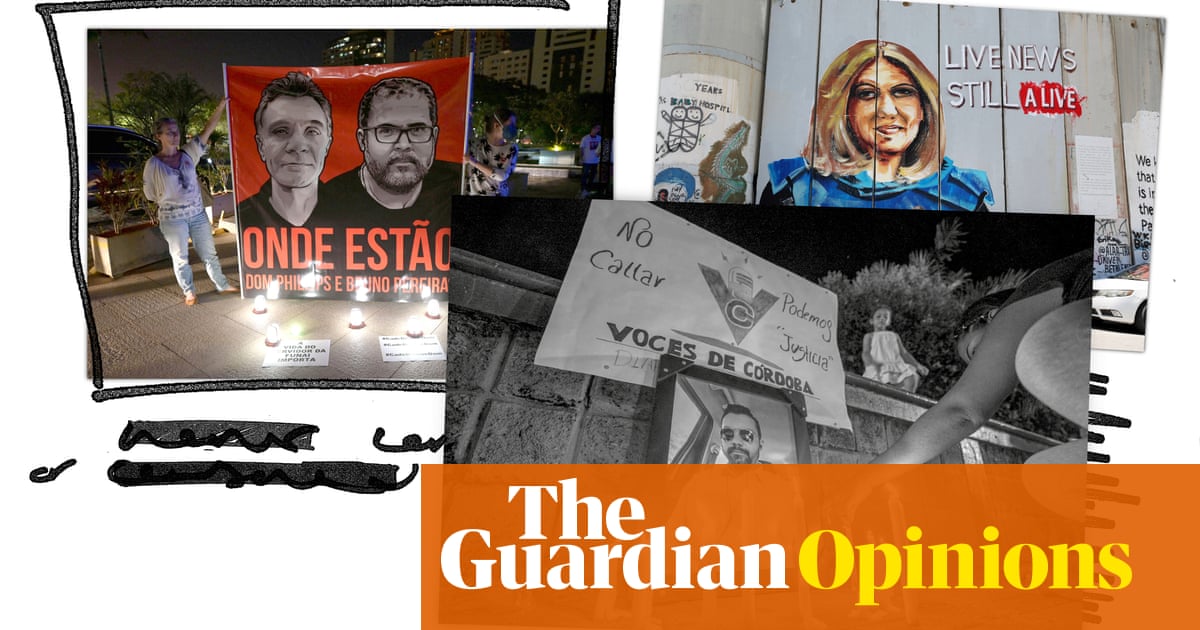World
Across the world, journalists are under threat for sharing the truth | Jonathan Watts

Conflict in Gaza, war in Ukraine, a battle over the global environment – the world is becoming an increasingly hostile place, particularly for frontline journalists.
Last year saw 99 killings of reporters, up 44% on 2022 and the highest toll since 2015.
Without the courage of correspondents to continue working in conflict areas, press organisations warn the world will start to see “zones of silence”, where the risks are so great that important stories go unreported.
Last year’s high toll was almost entirely due to Gaza, where a Guardian editorial noted “no war has killed so many journalists so quickly”.
The vast majority are Palestinian reporters who, according to the Committee to Protect Journalists, appear to have been targeted by Israeli forces. The Guardian was among more than 30 news organisations that signed an open letter expressing solidarity with journalists working in Gaza and calling for their protection and freedom to report.
This is much more than a matter of principle; solidarity is a matter of survival. Over the years, Guardian reporters have been kidnapped in Iraq and Afghanistan, beaten in Pakistan, expelled from Russia, and arrested in Egypt, Zimbabwe and China.
For our work to continue in such adverse circumstances, readers need to recognise the value of a free media. Without it, there is no hope of a robust democracy or a healthy environment.
The search for the truth can come at a horrific cost.
Two years ago, a regular Guardian contributor, Dom Phillips, was murdered in the Brazilian Amazon, with the Brazilian Indigenous expert Bruno Pereira. On the first anniversary of the killings last year, the Guardian joined an international collaboration to amplify their work.
A group of Dom’s journalist friends, including myself, are also working on a crowdfunded project to finish the book that he was working on at the time of his death: How to Save the Amazon: Ask the People Who Know. It will be published next year.
The number of environmental journalists being attacked or killed is rising and it continues to be one of the most dangerous fields of journalism after war reporting. Though the trend is accelerating, prosecutions remain dismally low, with very few cases leading to convictions.
Instead, the law appears to be increasingly used against journalists. One of the most disturbing trends in recent years has been the arrests or police harassment of journalists covering environmental protests. This has stirred outrage in the UK, the Netherlands, France, Spain, Canada, Australia, Azerbaijan, the US and China, which is consistently the biggest jailer of reporters.
Thanks to the readers who financially support our work, as well as our unique trust-owned model, the Guardian can take an independent line on these existential issues. We are not dependent on advertising or the commercial interests of a powerful owner.
But huge challenges remain for the media in general.
Throughout this week we will be marking Friday’s World Press Freedom Day with a series of articles about different threats posed to all types of reporters, from those working in exile and still facing threats from their home states, to environmental journalists facing up to violence and censorship as well as female journalists being targeted because of their sex. We want to use our platform to highlight the work they are doing, often in incredibly dangerous circumstances.
The risks may be growing, and the space to operate may be increasingly constrained, but we are more determined than ever to tell the stories of our age so that you, the readers, have the information to act as voters, citizens, consumers and participants in the web of life on Earth.









